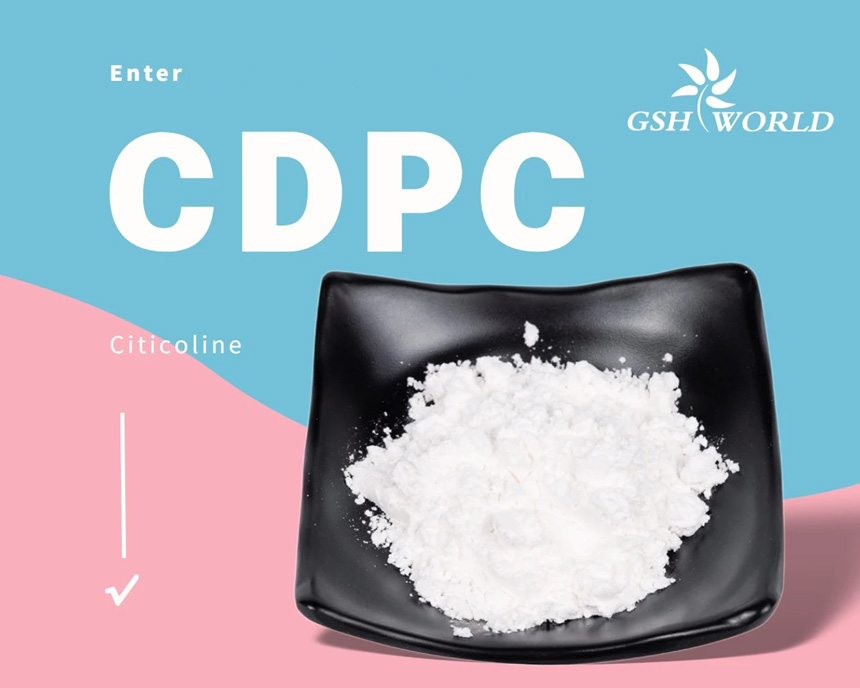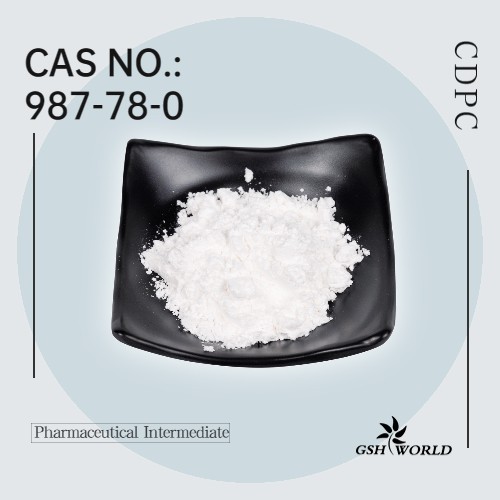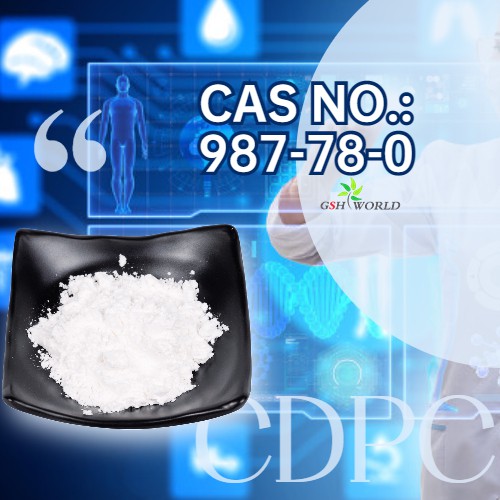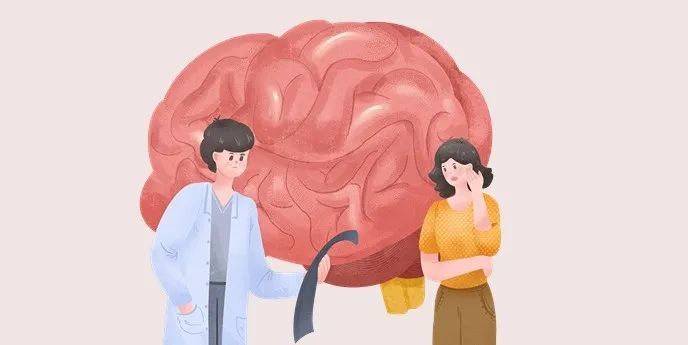Citicoline has been lauded for its cognitive enhancing properties in young and old people.
Clinical studies have confirmed some of its boosting effects and revealed other unexpected benefits, but have also pointed out significant limitations.
Read on for a final analysis of the benefits, dosage and safety of citicoline.
What is citicoline?
Citicoline (cytidine 5-diphosphate choline, CDP-choline) is essential for the production of phospholipids such as phosphatidylcholine. These molecules build cell membranes and protective nerve coatings in the body.
Citicoline is a more complex molecule than regular choline, or even alpha-GPC, but it is the same substance that is naturally produced in the brain.
To avoid confusion, the scientists decided to call it “citicoline” when it is used as a treatment and “CDP-choline” when it is produced in the body.
Once ingested, it releases two compounds: cytidine and choline. After they cross the blood-brain barrier, neurons in the brain use them to make citicoline and other phospholipids.
Choline boosts acetylcholine and other neurotransmitters to keep the nervous system running smoothly.
The body converts CDP-choline into many other beneficial compounds.
Citicoline may have more benefits and fewer side effects than plain choline.
supporter
Enhance cognition
Prevent brain damage
May help treat depression and drug addiction
Support stroke recovery
Improve vision
skeptic
Most benefits lack stronger clinical evidence
Long-term use may put strain on the kidneys
Not suitable for children and pregnant women
How citicoline works
Citicoline increases the production of neurotransmitters and cell building blocks.
In addition to acetylcholine, it boosts norepinephrine and dopamine in the brain.
It increases blood flow to the brain and stimulates mitochondria to produce more energy.
Adequate levels of CDP choline protect phosphatidylcholine and sphingomyelin, which build a protective nerve membrane called myelin.
CDP-choline also inhibits the inflammatory enzyme phospholipase A2 and boosts the main antioxidant glutathione.
Citicoline works by balancing neurotransmitters and protecting the nervous system from oxidation and age-related damage.
Dietary source
The body syntheses citicoline from cytidine and choline.
The best way to increase citicoline levels through food is to consume adequate food sources that provide both.
Choline-rich foods include:
- Organ meat (liver)
- egg
- chicken
- fish
- Whole grain
- beans
Cytidine is an RNA nucleoside, most concentrated in meat (especially organ meat); It is also found in colostrum.
Citicoline supplements (Cognizin, Somazina) are another potential source of additional choline, in addition to:
- choline
- Alpha GPC
- Phosphatidylcholine
- lecithin
Cdp-choline and α-GPC
Although both CDP-choline and alpha-GPC provide choline and have many health benefits, the body breaks them down and uses them in different ways.
Cdp-choline releases choline, cytidine, and other metabolites. It can also be converted into phosphatidylcholine, which the brain uses to make acetylcholine or to build cell membranes. Alpha-gpc provides choline more directly for the production of acetylcholine.
In turn, CDP-choline has a wider range of potential benefits, but alpha-GPC may have advantages in enhancing physical and mental performance.

The health benefits of citicoline
1) Cognitive enhancement
Age-related cognitive decline
Cognitive abilities tend to decline with age due to reduced blood flow to the brain or for other reasons.
A review of 14 clinical trials concluded that CDP-choline can improve memory and behavior in patients with mild to moderate cognitive impairment, including those with poor brain circulation.
Based on data from more than 2,800 older people patients, after receiving citicoline treatment, memory problems disappeared in 21% of patients and memory improved in 45% of patients.
The study lacked placebo controls, so we should take the results with a grain of salt.
Citicoline (1000mg for 9 months) was beneficial in 350 older people patients with mild cognitive impairment because it was able to:
- Enhanced nerve membrane
- Increases norepinephrine and dopamine levels
- Protection against oxidative damage
In three studies of 210 patients with dementia and poor brain circulation, CDP-choline improved memory, reaction speed and behavior. The higher the dose of citicoline (2000mg), the better the effect was.
Intellectual promoting effect
Many people use citicoline to improve thinking, enhance memory, and prevent cognitive decline. Let’s see what science has to say about its role as a puzzle…
In two clinical trials of 135 healthy adults, citicoline (250-500mg) improved attention and mental clarity.
A drink containing caffeine and CDP choline (250 mg) enhanced cognitive performance and reduced reaction time in 60 volunteers. Caffeine is a known stimulant, and it may have contributed to the results.
In 24 healthy adults, higher doses of citicoline (500 or 1,000 mg) improved various cognitive markers – processing speed, working and verbal memory, executive function – but only in those with poorer cognitive ability.
In the same study, supplements had no effect on average performers and even slightly impaired the cognitive abilities of high performers
Marijuana abuse can impair cognitive abilities. In a study of 19 chronic marijuana smokers, citicoline (2,000 mg per day for 8 weeks) reduced impulsive responses and improved cognitive performance.
All of the participants wanted to quit smoking, and the researchers think the effects of CDP-choline may have helped steer them in that direction.
According to preliminary research, citicoline can enhance attention and mental clarity, especially in people with poor cognitive abilities.
2) Stroke rehabilitation
Cutting off the blood supply to a specific brain region can kill neurons and cause severe brain damage. Citicoline may help by strengthening nerve membranes and blocking the production of free radicals.
According to a meta-analysis of four clinical trials (more than 1,300 patients), taking 2,000 mg of citicoline within 24 hours after a stroke increased the odds of a full recovery by 38%.
Data from more than 4,000 stroke survivors show that citicoline improves outcomes and AIDS recovery; Higher doses (2000-4000mg) are more effective. There was no placebo control in this study, so no definitive conclusions can be drawn.
Two studies of more than 3,000 patients found no significant benefit of CDP-choline for acute stroke.
Clot-busting drugs remain the first choice for acute stroke. Two combined reviews concluded that citicoline may provide additional benefit or help patients who are unable to receive their preferred treatment.
Timely administration of citicoline may improve stroke recovery, but research is limited. Clot-busting drugs remain the first choice for acute stroke.
3) Vision problems
Like protecting nerves in the brain and spinal cord, citicoline may have the same beneficial effect on the optic nerve.
It may reverse damage to retinal neurons and help treat eye diseases.
- Optic neuropathy
- glaucoma
- amblyopia
glaucoma
Increased eye pressure and other factors can damage the optic nerve and lead to glaucoma, sometimes leading to complete blindness.
In two clinical trials in 80 glaucoma patients, long-term oral citicoline repaired nerve damage, improved vision and slowed disease progression.
Citicoline eye drops showed the same results in two other clinical trials (68 patients).
amblyopia
Amblyopia, or “lazy eye,” occurs when the eyes and brain don’t communicate well. It can cause blurred vision in one eye.
In three clinical trials of 190 children, oral citicoline improved standard amblyopia treatment (eye patch).
Injection of CDP choline (1000mg daily) healed the optic nerve and improved vision in 10 adults with amblyopia. The study had a small sample size and lacked placebo controls, so the results are questionable.
Optic neuropathy
Optic neuropathy is another type of optic nerve injury that may interfere with vision. In 26 patients with optic neuropathy, citicoline (1600mg/ day for 2 months) improved vision by repairing nerve damage.
4) Brain injury
Oxidative stress, autoimmune reactions, and environmental toxins can cause severe brain cell damage.
Citicoline protects the brain and spinal cord from these stresses by protecting the myelin sheath of cells and enhancing important neurotransmitters.
Alzheimer’s disease
In three clinical trials, citicoline (1000mg daily for 1-3 months) improved Alzheimer’s symptoms:
- Improve mental performance
- Stimulate cerebral blood flow
- Reduces levels of inflammatory molecules (histamine and IL1B)
In a third study, patients with a genetic predisposition to Alzheimer’s disease (APOE-e4 carriers) experienced even greater benefits. This is an important finding because APOE-e4 carriers respond differently (and often worse) to various interventions.
Citicoline enhanced the effects of drug treatments for Alzheimer’s disease and slowed the progression of two observational trials (more than 600 patients).
In rats with Alzheimer’s disease, citicoline protects nerves from protein mutations and reduces blood flow. As a result, the rats had fewer cognitive impairments and improved memory.
Citicoline may help treat Alzheimer’s disease and improve standard care, but existing clinical evidence is weak.
parkinsonism
The destruction of dopamine neurons in Parkinson’s disease causes muscle stiffness, tremors and other symptoms.
In rats with Parkinson’s disease, citicoline relieves muscle stiffness by increasing dopamine levels in the brain. It also enhances the effects of standard treatment.
Multiple sclerosis
Inflammatory destruction of the myelin sheath of the external nerve sheet can trigger multiple sclerosis, accompanied by severe physical and cognitive impairment. In animals with multiple sclerosis, scientists have observed the potential of citicoline to enhance myelin recovery and motor coordination.
5) Mental disorders and drug addiction
depression
In a study of 50 patients, adding citicoline to an antidepressant improved depressive symptoms and recovery.
In rats, CDP-choline raised levels of norepinephrine, dopamine and serotonin in the brain’s memory, mood and movement centers.
Methamphetamine and cocaine addiction
Citicoline reduced depressive symptoms in 60 methamphetamine (meth) people with alcohol addiction, but had no effect on drug use (2000 mg/day for 3 months). In another study of 31 methamphetamine people with alcohol addiction, citicoline protected the brain and reduced drug use.
In more than 130 cocaine people with alcohol addiction with bipolar disorder, citicoline (500-2,000 mg for 3 months) reduced drug use but did not affect mood. However, in a trial of 20 heavy cocaine users, it had no effect.
A review of nine trials concluded that citicoline may have a slight benefit on substance addiction, particularly cocaine, but highlighted the need for stronger clinical evidence.
schizophrenia
Citicoline enhanced the effect of standard treatment in 66 patients with schizophrenia. It improves so-called “negative” symptoms such as emotional dullness, poor communication, and stiffness. These are particularly difficult to treat with conventional drugs.
In 24 healthy adults, CDP-choline enhanced cognition by stimulating nicotinic acetylcholine receptors, which are usually less active in schizophrenia.
Preliminary studies are promising, but there is not enough evidence to support the use of citicoline to treat mental disorders and drug addiction.
Side effects and safety
This list does not include all possible side effects. If you notice any other side effects, contact your doctor or pharmacist.
Many clinical trials of citicoline have confirmed its safety. In rare cases, it can cause minor digestive and neurological problems.
In a safety study in rats, citicoline did not cause significant side effects even at much higher doses than usual (2000mg/kg). Long-term use of high doses can increase creatinine levels and kidney mineralization, possibly due to its phosphorus content.
In another study in rats, citicoline increased blood levels of ACTH, which stimulates the production of the stress hormone cortisol. However, the researchers injected citicoline directly into brain fluid, and it is unclear whether oral administration would have this effect.
Sensitive group
Children, pregnant and breastfeeding women should avoid citicoline until we know more about its safety in these sensitive populations.
If you have an allergic reaction to any choline containing supplements (choline, lecithin, alpha-GPC), you may want to avoid citicoline.
Citicoline doses and supplements
The following doses may not be appropriate for you personally.
If your doctor recommends citicoline, work with them to find the best dose based on your health and other factors.

The following citicoline doses have produced some beneficial effects in clinical trials:
- Enhanced cognition and memory: 250-1000 mg/day
- Age-related cognitive decline: 1000-2000 mg/day for more than 4 weeks
- Alzheimer’s disease: 1000 mg/day for 1-3 months
A higher dose of 2000-2500mg per day for more than 6 weeks is effective for:
- depression
- Drug addiction
- Stroke rehabilitation
Most eye diseases respond to 800-1600mg citicoline, and treatment lasts 2-4 months. For glaucoma, 3 drops of eye drops per day for 4 months are also effective.
Citicoline supplement
Citicoline supplements have not been approved by the U.S. Food and Drug Administration for medical use.
In general, regulatory agencies do not guarantee the quality, safety, and effectiveness of supplements. Consult your doctor before supplementing.
Most products on the market come in a pill containing 250-500 mg CDP-choline.
Their potency may be a key factor, as many diseases require 2,000 mg or more of CDP-choline to be taken daily.
Vegetarian-friendly citicoline supplements are also available.
Sum up
Citicoline (CDP-choline) protects nerves by strengthening nerve membranes and increasing levels of important neurotransmitters. It may have a nootropic effect on healthy people, prevent cognitive decline in the older people, and support stroke recovery.
Oral supplements or drops may also help treat eye conditions such as glaucoma, but there is currently insufficient evidence of benefits for mental health and addiction.
You can get the building blocks of it through food, especially by eating more organ meat. However, the doses used in clinical trials (1000-2000mg/ day) can only be reached with supplements.
Citicoline is safe and well tolerated. Minor side effects, such as digestive problems and headaches, may occur. Children, pregnant women, and people with allergies to choline-containing supplements should avoid taking them, while others should consult a doctor first.




